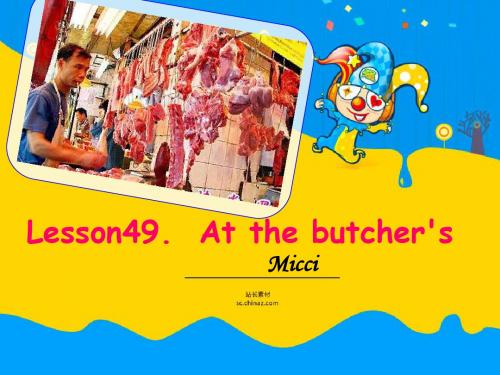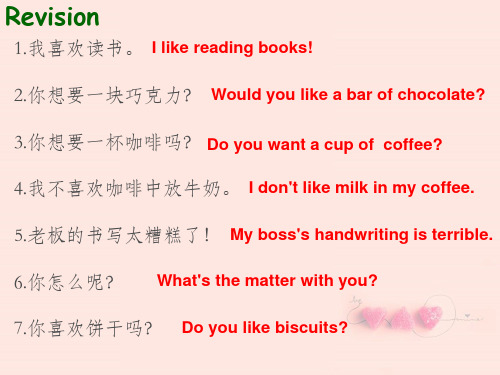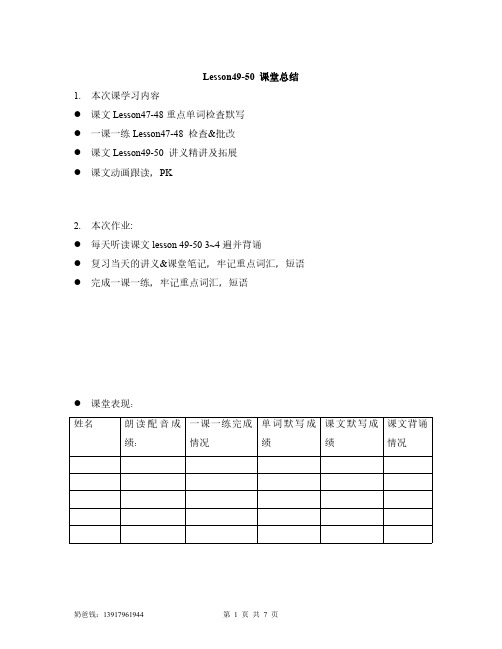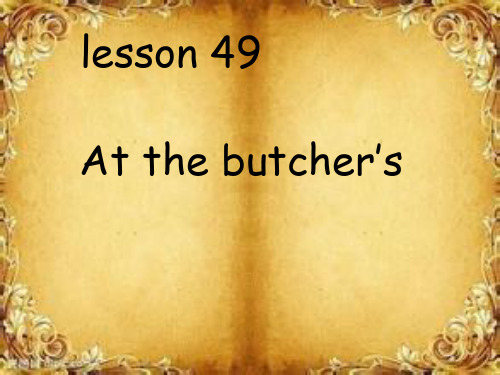裕兴新概念学习笔记 第一册(49-50)
新概念第一册Lesson49-50

Text
• BUTCHER: Do you want any meat today, Mrs.Bird?
• MRS. BIRD: Yes, please. • BUTCHER: Do you want beef or lamb? • MRS. BIRD: Beef,please. • BUTCHER: This lamb's very good. • MRS. BIRD: I like lamb, but my
Lesson49. At the butcher's
Micci
猪肉 羊肉 鸡肉 牛肉
Have you ever been there?
at the butcher's 在肉店
at the doctor's 在诊所
at Mr. Smith’s 在史密斯家
butcher 卖肉的,屠夫 /u/ /ə/
Eg: The boy is at the butcher's . He wants to buy some meat .
meat 肉 /i:/
Eg: Do you want any meat?
mince 肉馅 /I/
Eg: I want a pound of mince, because I want to make some dumplings.
eg. The teacher tell you to remember this sentence. You should tell him to clean the floor.
1. 我妈妈叫我去做作业。 eg. My mother tells me to do the homework.
tell sb not to do sth. 告诉某人不要做某事 eg. My father tell me not to play the computer
新概念英语第一册 Lesson 49-50

S5:
I like lamb, but my husband doesn't.
1)but 表示转折 意为:但是,然而. Eg:我喜欢音乐,但是他不喜欢 I like music,but he doesn’t. 2)句子中doesn’t后省略了 like lamb But在连接并列句时,在后一部分句中可以省略与前 一部分句中相同的谓语动词和宾语
• 疑问句 (助动词提前) •Do / Does+主语+动词原形 •你每天说英语吗?
Do you speak English every day? •Yes,I do。 No,I don't. •她每天说英语吗? •Does she speak English every day? •Yes,she does. No,she doesn't
• • • • •
第三人称单数形式
1.直接在动词后+S 2.以s,x,sh,ch结尾的+es 3.以辅音字母+y结尾的,把y变i +es 4以字母o结尾的,有生命的+s,无生命的 +es • 5.不规则:have---has
• 一般现在时的三种类型 • 1. 肯定:主语+Be动词+...... • 否定:主语+be not+.... • 疑问:Be +主语......? • 2.肯定:主语+实义动词+...... • 否定:主语+don't / doesn't+动词原形+.... • 疑问 :Do / Does+动词原形+....... • 3.肯定:主语+助动词+...... • 否定:主语+助动词+not+.... • 疑问:助动词+主语+......
新概念一 L49-50

To tell you the truth, Mrs. Bird, I don’t like chicken either!
1)tell v. 告诉 tell sb sth 告诉某人某事 tell sb to do sth. 告诉某人做某事
~ the time in English 用英语报时 ~ a lie 撒谎 ~ the truth 说实话 2)truth n.实情 true adj.真实的
疑问句
借助助动词提问do/does Do / Does + 主语+动词~
你每天说英语吗? Do you speak English every day? (主语为 I, you及复数时, 助动词用do)
他每天说英语吗 ? Does he speak English every day?
(主语为第三人称单数时,助动词用do)
在英文表示“某一商店”的商店中, 往往可以把shop省略
eg . at the hairdresser’s (shop) 理发店
lamb [læ m] n. 羊羔[C];羔羊肉[U]
e.g: 你想要些羔羊肉吗?
Would you like some lamb?
农场里有几只羔羊?
How many lambs are there on the farm?
选择疑问句( …or…)
你想要一个苹果还是一个香蕉呢? Do you want an apple or a banana ? An apple please! /A banana,please!
Truth or dare! 真心话大冒险(a game)
To be or not to be, that’s a question. 生存还是毁灭?这是个问题。
新概念英语第一册第49-50课

• I like lamb, too. 我也喜欢小羊肉。 • Can I come, too? 我也来,行吗? • I, too, have been to Shanghai. 我也到过上海。
• either • 一般用于否定句,位于句末,前面通常有逗 号。 • too • 常用于肯定句,有时也用于疑问句,但不 能用于否定句。常见于句末,too前常有逗 号;如果不在句末,too前后都应当有逗号。 • also • 用于肯定句中,位于居中 。
speak+
speak作及物动词,意为“说”“讲”,其宾语
语言 speak to sb. speak of 意为“提到、说起”
▲tell意为“告诉,对…说”.
tell the truth 说真话 tell a lie说谎 tell the time “报时“ tell a story讲故事 tell about a person / a game / a success tell sb. sth./ tell sth. to sb. tell sb. to do sth. tell : 辨别,说出区别 tell A from B tell the differences between A and B
Truth or dare! 真心话大冒险
选择疑问句
• What would you like to drink? 你喜欢喝什么? (无限性选择) • Which/What would you prefer, tea or coffee? 茶和咖啡,你喜欢哪一种? (两项选择) • Would you like tea, coffee, or milk? 你喜欢茶、咖啡、还是牛奶? (3项选择) • Did you go there, or didn't you? 你去了那儿还是没有去?
新概念英语第一册第49-50课重点语法

新概念英语第一册第49-50课重点语法一、重要句型或语法1、一般现在时1)表示兴趣或爱好2)第三人称作主语2、选择疑问句由or引导的疑问句,or前面的成分读升调,or后面的成分读降调。
回答时不能用Yes或No,而是直接在两者间做出选择回答。
如:Do you want beef↗ or lamb↘? Beef, please.二、课文主要语言点Do you want any meat today, Mrs. Bird? Yes, please. 可复习want与like的区别。
“Yes, please.”用来对别人的要求或申请等表示许可。
Do you want beef or lamb? Beef, please. 注意其语调和回答。
注意lamb中的b不发音。
I like lamb, but my husband doesn't. 注意句中doesn't后面省略了与but前面的并列句相同的谓语和宾语。
因为前后两句话结构相同,用but连接,且前后两句话是肯定句与否定句结构,从而形成了一个强烈对比,具有鲜明的强调效果。
介绍第三人称的变化规则。
What about some steak? what about相当于how about,用于提建议。
注意steak(牛排)与beef(牛肉)的区别。
This is a nice piece. 注意句中的piece后面省略了of steak。
Give me that piece. 可复习双宾动词的用法。
And a pound of mince, too. 可复习表量的名词的用法。
注意区分too与课文最后一句话中的either表示“也”的区别。
Do you want a chicken, Mrs. Bird? chicken表示鸡肉时为不可数名词,表示整只鸡时是可数的。
My husband likes steak, but he doesn't like chicken. 可对比参考前文中的“I like lamb, but my husband doesn't.”。
裕兴新概念英语第一册笔记:Lesson 49 At the butcher

Lesson 49 At the butcher'sNew words and expressions:butcher n. 卖肉者meat n.(食用)肉beef n.牛肉lamb n. 羔羊肉husband n.丈夫steak n.牛排mince n.肉馅,绞肉chicken n.鸡tell v.告诉truth n.实情either adv.也(用于否定句)butcher n. 卖肉的人,屠夫meat n.(食用)肉(不可数名词)eg.Mr. Green likes meat very much. 格林先生非常喜欢吃肉。
eg. Do you eat meat every day? 你每天都吃肉吗?--- Yes, I do. 是的。
--- No, I don't. 不。
beef n.牛肉(不可数名词)eg. There isn't any beef on the plate. 盘子中没有什么牛肉。
eg.My parents don't like beef. 我的父母不喜欢吃牛肉。
lamb n. 羔羊肉,小羊肉eg. I don’t like lamb. 我不喜欢吃羔羊肉。
eg. He doesn't like lamb, either. 他也不喜欢羔羊肉。
husband n.丈夫wife 妻子spouse 夫妻bride n.新娘groom n.新郎fiancee 未婚妻fiance 未婚夫girlfriendboyfriendsteak n.牛排steak raresteak mediumsteak well-doneeg. How do you like your steak?Steak rare/medium/well-done.mince n.肉馅(不可数名词)eg. She wants some mince. 她想要一些肉馅。
eg. She doesn't want any mince. 她不想要一些肉馅。
新概念英语第一册Lesson49-50

mince 肉馅,绞肉(不可数) I want a pound of mince. Because I want to make some dumplings .
chicken 鸡(可数名词) 鸡肉(不可数名词)
cock [kɔk]公鸡
hen [hen] 母鸡
Butcher: Do you want a chicken, Mrs. Bird? They’re very nice. Mrs. Bird: No, thank you. My husband likes steak, but he doesn’t like chicken. Butcher: To tell you the truth, Mrs. Bird. I don’t like chicken either!
chick [tʃik]小鸡wife (妻子) husband (丈夫)
tell /tel/ 告诉 tell a story 讲故事 Eg: My mother tells me a story every night. truth /truːθ/ 实情,事实 To tell you the truth 说老实话 To tell you the truth, I don’t like black coffee.
steak 牛排 a piece of steak
lamb 羊羔肉(不可数) Eg: Do you want beef or lamb ? Beef , please . Lamb , please .
a lovely lamb 一只可爱的小羊羔
我喜欢牛奶。 我不喜欢牛奶。 他喜欢苹果。 他不喜欢苹果。 1. I like milk. 2. I don’t like milk. 3. He likes apples. 4. He doesn’t like apples.
新概念一 Lesson 49-50 课堂笔记+课堂总结

2. 本次作业: 每天听读课文 lesson 49-50 3~4 遍并背诵 复习当天的讲义&课堂笔记,牢记重点词汇,短语 完成一课一练,牢记重点词汇,短语
Chick Hen Rooster/cock
chicken, hen, cock
8. Tell e.g. My mother always tells me a story before I go to sleep.
奶爸钱:13917961944
第4页共7页
我妈妈总是在我睡前给我讲一个故事。 常用搭配: 讲故事:tell a story 说谎:tell a lie
12. Potato e.g. 土豆是一种蔬菜,不是水果 Potato is a kind of vegetable, not a fruit. 思考:potato 的复数形式:potatoes
奶爸钱:13917961944
第5页共7页
13. Cabbage 14. Lettuce 15. Pea 16. Bean 常见豆类: Soya beans:大豆 咖啡豆:coffee beans broad beans:蚕豆
奶爸钱:13917961944
第2页共7页
lamb, mince, beef, steak
4. Lamb 做羔羊肉解释:Do you want lamb? 做羔羊解释:How many lambs are there on the farm? 农场里有几只羔羊?
(完整版)新概念第一册第49-50课重点知识

Lesson 49-50 Do you want any meat today?今天想来点肉吗?Meat肉,pork猪肉,beef牛肉,lamb羊羔肉,mutton羊肉,fish鱼肉,chicken鸡肉,duck鸭肉,steak牛排,mince肉馅。
Who cooks at home? Wife or husband妻子还是丈夫?请记住三个重要的知识点:1,to tell you the truth老实说,说实话,固定搭配背诵;2,either用在否定句句末,表示也,和too意思一样,知识either是否定句,too是肯定句;3,give me...把。
给我。
你认识以下词组吗?choice grapes上等的葡萄,ripe bananas成熟的香蕉,garden beans四季豆,coffee beans咖啡豆,garden peas豌豆,fresh cabbages新鲜的卷心菜,choice tomatoes 精选的西红柿,fresh lettuces新鲜的生菜知识扩充:What would you like, coffee or tea? I'd like…I don't like…注意don't like = dislike,want=need想要,需要。
Jam果酱,traffic jam交通堵塞,potato土豆,hot potato棘手的问题,难处理的事,butcher屠夫,卖肉者,at the butcher's 肉店。
新概念课堂笔记 第一册 Lesson 49-50

新概念英语课堂笔记第一册Lesson 49-50husband【用法】n. 丈夫【词组】husband and wife 夫妇tell【用法】v. 告诉;吩咐;讲述;辨别【词组】tell sb. to do sth. 吩咐(告诉)某人做某事tell sb (about) sth. 告诉某人(有关)某事tell sb. a story = tell a story to sb. 给某人讲故事tell the difference between A and B 分辨A 与B之间的不同truth【用法】n. 实情;真相;事实(不可数)【词组】To tell you the truth 实话说【扩展】true adj. 真实的;真正的either【用法】adv. 也(用于否定句)【辨析】also, too, either ——也also 常用在肯定句或疑问句的句中too 常用在肯定句或疑问句的句尾either 常用在否定句的句尾e.g. I also write short stories. 我也写短篇小说Do you also want to have a look? 你也想看看吗?He likes China, too. 他也喜欢中国。
Are you in Grade 3, too? 你也在三年级吗?She is not a Japanese, I’m not, either. 她不是日本人,我也不是。
My sister doesn’t like this song, either. 我妹妹也不喜欢这首歌。
meat 常用肉类名词meat n. 肉fish n. 鱼(肉)beef n. 牛肉pork n. 猪肉mutton n. 羊肉lamb n. 羔羊(肉)chicken n. 鸡(肉)turkey n. 火鸡(肉)steak n. 牛排mince n. 肉馅序数词13th~24th13th----thirteenth 14th----fourteenth15th----fifteenth 16th----sixteenth17th----seventeenth 18th----eighteenth19th----nineteenth 20th----twentieth21st----twenty-first 22nd----twenty-second 23rd----twenty-third 24th----twenty-fourthAt the butcher’s【译文】在肉店【用法】butcher 名词,“卖肉的”,表示一种传统小作坊里的手艺人,要表示他们工作的地点,就是在前面加上the,后面加上–s,要表示在这样的地方,通常用介词at。
新概念第一册Lesson49&50

Do your parents like choice grapes?
•Yes ,they do. They like grapes, but they don’t want any.
Does your grandma like ripe bananas?
Yes,
she does.
She likes ripe bananas, but she doesn’t want any.
husband n. 丈夫 truth
n. 实情
tell the truth
tell v. 告诉
either adv. 也(用于否定句)
Listening comprehension
What does Mr. Bird like?
Text
BUTCHER:
Mrs.Bird? MRS. BIRD: Yes, please. BUTCHER: Do you want beef or lamb? MRS. BIRD: Beef,please. BUTCHER: This lamb's very good. MRS. BIRD: I like lamb, but my husband doesn't .
Practice: The Simple Present Tense
Does the girl like coffee?
No, she doesn’t.
I think she likes tea very much. tea Does the lady like tea?
I’m afraid she doesn’t like tea.
Text
MRS.
BIRD: No, thank you. MRS. BIRD: My husband likes steak, but he doesn't like chicken BUTCHER: To tell you the truth, Mrs. Bird, I don't like chicken either !
新概念英语第一册第49-50课-At the butcher's

新概念英语第一册第49-50课:At the butcher'sLesson 49 At the butcher's在肉店Listen to the tape then answer this question. What does Mr. Bird like?听录音,然后回答问题。
伯德先生喜欢什么?BUTCHER: Do you want any meat today.Mrs. Bird?肉商:您今天要买点肉吗,伯德夫人?MRS.BIRD: Yes, please.伯德夫人:是的,我买一点。
BUTCHER: Do you want beef or lamb?肉商:您要牛肉还是要羔羊肉?MRS.BIRD: Beef, please.伯德夫人:请给我牛肉。
BUTCHER: This lamb's very good.肉商:这羔羊肉很好。
MRS.BIRD: I like lamb,but my husband doesn't.伯德夫人:我喜欢羔羊肉,可我丈夫不喜欢。
BUTCHER: What about some steak?This is a nice piece.肉商:来点牛排吗?这块很好。
MRS.BIRD: Give me that piece, please.伯德夫人:就请给我那块吧。
MRS.BIRD: And a pound of mince, too.伯德夫人:再来一磅绞肉。
BUTCHER: Do you want a chicken,Mrs. Bird?They 're very nice. 肉商:您要买只鸡吗,伯德夫人?这些鸡很好。
MRS.BIRD: No, thank you.伯德夫人:不要了,谢谢。
MRS.BIRD: My husband likes steak,but he doesn't like chicken. 伯德夫人:我丈夫喜欢牛排,但他不喜欢鸡。
新概念英语第一册第49-50课

B Answer these questions using I, he or she. 模仿例句回答以下问题,选用I, he或she。 Examples: Does Penny like tomatoes? Yes, she does. She likes tomatoes, but she doesn't want any. Do you like potatoes? Yes, I do. I like potatoes, but I don't want any.
tell:tell sb. sth. 告诉某人某事 tell sth. to sb. 告诉某人某事 tell sb. about/of sth. 向某人讲起
Flash words
• • • • • • • Butcher [‘butʃә(r)] meat [mi:t] beef [bi:f] lamb [lӕm] steak [ steik] mince [mins] chicken [tʃikin]
Do you want a chiken, Mrs. Bird? They are very nice.
可数:(一整只) 鸡 不可数:鸡肉
No, thank you.
My husband likes steak, but hen.
说实话,老实告诉你
To tell you the truth, Mrs. Bird,
Do you like running man?
一般现在时
肯定结构 1.主语 + be +其它. 如:It is cold today. 2.主语 + 动词原形+其它 如:I want an apple. 3.主语 + 动词+s/es(第三人称单数作主语时) 如: She likes apples.
- 1、下载文档前请自行甄别文档内容的完整性,平台不提供额外的编辑、内容补充、找答案等附加服务。
- 2、"仅部分预览"的文档,不可在线预览部分如存在完整性等问题,可反馈申请退款(可完整预览的文档不适用该条件!)。
- 3、如文档侵犯您的权益,请联系客服反馈,我们会尽快为您处理(人工客服工作时间:9:00-18:30)。
Lesson 49 At the butcher's 在肉店New Words and expressions 生词和短语butcher n. 卖肉的meat n. ( 食用)肉beef n. 牛肉lamb n. 羔羊肉husband n. 丈夫steak n. 牛排mince n. 肉馅.绞肉chicken n. 鸡tell v. 告诉truth n. 实情either adv. 也(用于否定句)butcher n. 卖肉的人, 屠夫meat n. (食用) 肉(不可数名词)eg. Mr. Green likes meat very much.格林先生非常喜欢吃肉.Do you eat meat every day?你每天都吃肉吗?Yes, I do./ No, I don't.是的./不.beef n. 牛肉(不可数名词)eg. There isn't any beef on the plate.盘子中没有什么牛肉.My parents don't like beef.我的父母不喜欢吃牛肉.lamb n. 羔羊肉,小羊肉eg. I don't like lamb.我不喜欢吃羔羊肉.He doesn't like lamb, either.他也不喜欢羔羊肉.husband n. 丈夫wife n. 妻子spouse n. 夫妻bride n. 新娘groom n. 新郎fiancee n. 未婚妻fiance n. 未婚夫girlfriend n. 女朋友boyfriend n. 男朋友steak n. 牛排steak rare 三分熟steak medium 半熟steak well-done 全熟eg. How do you like your steak?Steak rare /medium / well-donemince n. 肉馅(不可数名词)eg. She wants some mince.她想要一些肉馅.She doesn't want any mince.她不想要一些肉馅.Does she want any mince?她想要一些肉馅吗?Yes, she does.是的, 她想要.No, she doesn't不, 她不想要.chicken n. 鸡, 鸡肉eg. There are some chickens behind the house.在房子后面有一些小鸡.What do you want?你想要点什么?I want some chicken.我想要一些鸡肉.tell v. 告诉eg. tell me 告诉我.speak 发言speak+ 语言speak Chinese 说汉语speak English 说英语speak French 说法语talk 谈话,交谈eg. I want to talk to you.我想和你谈一谈.say 说(强调说的内容)eg. He always says that he is a good man.他总是说他是一个好男人.tell v. 告诉下面补充tell 的一些用法1. tell a lie说谎2. You're telling me!我早就知道这件事了!3. Tell me another我不相信你.truth n. 实情,真相tell the truth 说实话,告诉真相find out the truth 查明事实真相either adv. 也(用于否定句)too 用于肯定句和疑问句中eg. I like that girl ,too.我也喜欢那个女孩.Is he a policeman, too?他也是一名警察吗?My brother doesn't like coffee, either.我的兄弟也不喜欢咖啡.She isn't tall, either.她也不是很高.TEXT 课文Questions:1. Does Mrs. Bird want beef or lamb?2. Does Mr. Bird like lamb?3. Does the butcher like chicken?Listen to the tape then answer this question.听录音,然后回答问题。
What does Mr. Bird like? He like steak.伯德先生喜欢什么?他喜欢牛排(阅读中请注意伯德夫人是怎样谈论她丈夫的喜好的?) BUTCHER: Do you want any meat today. Mrs. Bird?肉商:您今天要买点肉吗,伯德夫人?MRS.BIRD: Yes, please.伯德夫人:是的,我买一点。
BUTCHER: Do you want beef or lamb?肉商:您要牛肉还是要羔羊肉?MRS.BIRD: Beef, please.伯德夫人:请给我牛肉。
BUTCHER: This lamb's very good.肉商:这羔羊肉很好。
MRS.BIRD: I like lamb, but my husband doesn't.伯德夫人:我喜欢羔羊肉,可我丈夫不喜欢。
BUTCHER: What about some steak? This is a nice piece. 肉商:来点牛排吗?这块很好。
MRS.BIRD: Give me that piece, please.伯德夫人:就请给我那块吧。
MRS.BIRD: And a pound of mince, too.伯德夫人:再来一磅绞肉。
BUTCHER: Do you want a chicken, Mrs. Bird? They're very nice.肉商:您要买只鸡吗,伯德夫人?这些鸡很好。
MRS.BIRD: No, thank you.伯德夫人:不要了,谢谢。
MRS.BIRD: My husband likes steak, but he doesn't like chicken.伯德夫人:我丈夫喜欢牛排,但他不喜欢鸡。
BUTCHER: To tell you the truth, Mrs. Bird, I don't like chicken either!肉商:说老实话,伯德夫人,我也不喜欢鸡。
课文讲解:A: Do you want any meat today. Mrs. Bird?您今天要买点肉吗,伯德夫人?B: Yes, please.是的,我买一点。
Do you want beef or lamb?您要牛肉还是要羔羊肉?B: Beef, please.请给我牛肉。
由助动词引导的疑问句, want是实义动词,含有实义动词的一般现在时,疑问句式要借助助动词do或does . you "你" ,是第二人称代词,变成疑问句要用do.meat 肉(不可数名词)any 可修饰不可数名词,用在否定或疑问句中.Mrs. + 姓氏(丈夫的姓氏)选择疑问句, or 前面用升调, 后面用降调. 选择疑问句可以用系动词引导,又可以用助动词引导.eg. Are you tall or short?你是高,还是矮的?Is he a policeman or an engineer?他是一名警察还是一名工程师?Do you like coffee, milk or tea?你喜欢咖啡, 牛奶还是茶?Does Mrs. Bird want beef or lamb?伯德夫人想要牛肉还是羊肉?A: This lamb's very good.这羔羊肉很好。
B: I like lamb, but my husband doesn't.我喜欢羔羊肉,可我丈夫不喜欢。
This lamb's = This lamb islamb 羔羊肉(不可数名词), 后面只能接单数系动词is.but, 连词, 表示转折关系.eg. He likes coffee , but he doesn't like black coffee.他喜欢咖啡,但他不喜欢喝黑咖啡.They are short ,but they are strong.他们很矮,但他们很强壮.Wangcheng is a man, but he always behaves like a woman.but my husband doesn't 后面省略了like lamb. 用but 连接的并列句,在后部分可以省略与前部分中相同的谓语动词和宾语.eg. She is from Japan, but he isn't (from Japen).她来自日本,而他则不是.We like music, but they don't (like music).他们喜欢音乐,但他们不喜欢.A: What about some steak? This is a nice piece.来点牛排吗?这块很好。
A: Give me that piece, please.就请给我那块吧。
B: And a pound of mince, too.再来一磅绞肉。
What about .... , How about ... 用来征求对方的看法或意见, 后面加名词或代名词.What/How about this yellow blouse?这件黄色女衬衫怎么样?What/How about going out for a walk?出去散散步怎么样?What / how about her idea?你觉得他的想法怎么样?piece : 代牛排, steak 是不可数名词.a piece of steak 一块牛排give sb sth = give sth to sbgive 后接双宾语, me (人) 是间接宾语,that piece (物) 是直接宾语.a pound of 一磅half a pound of 半磅a quarter of 1/4a quarter of a pound 1/4 磅A: Do you want a chicken, Mrs. Bird? They're very nice.您要买只鸡吗,伯德夫人?这些鸡很好。
B: No, thank you.不要了,谢谢。
B: My husband likes steak, but he doesn't like chicken.我丈夫喜欢牛排,但他不喜欢鸡。
